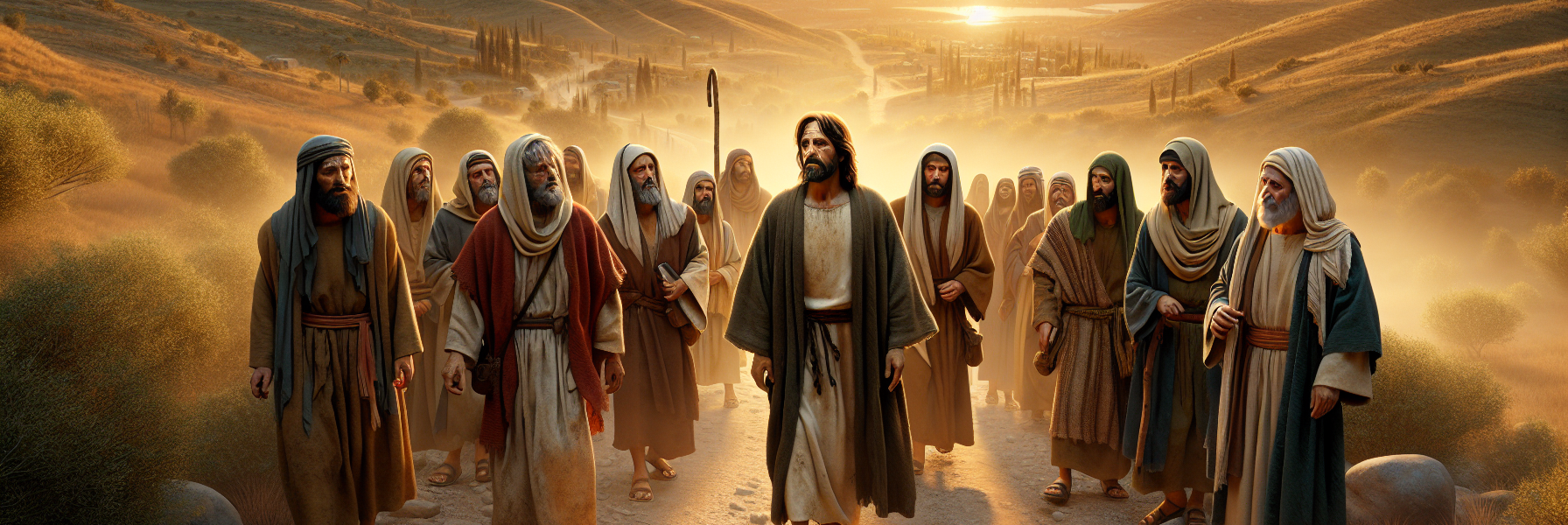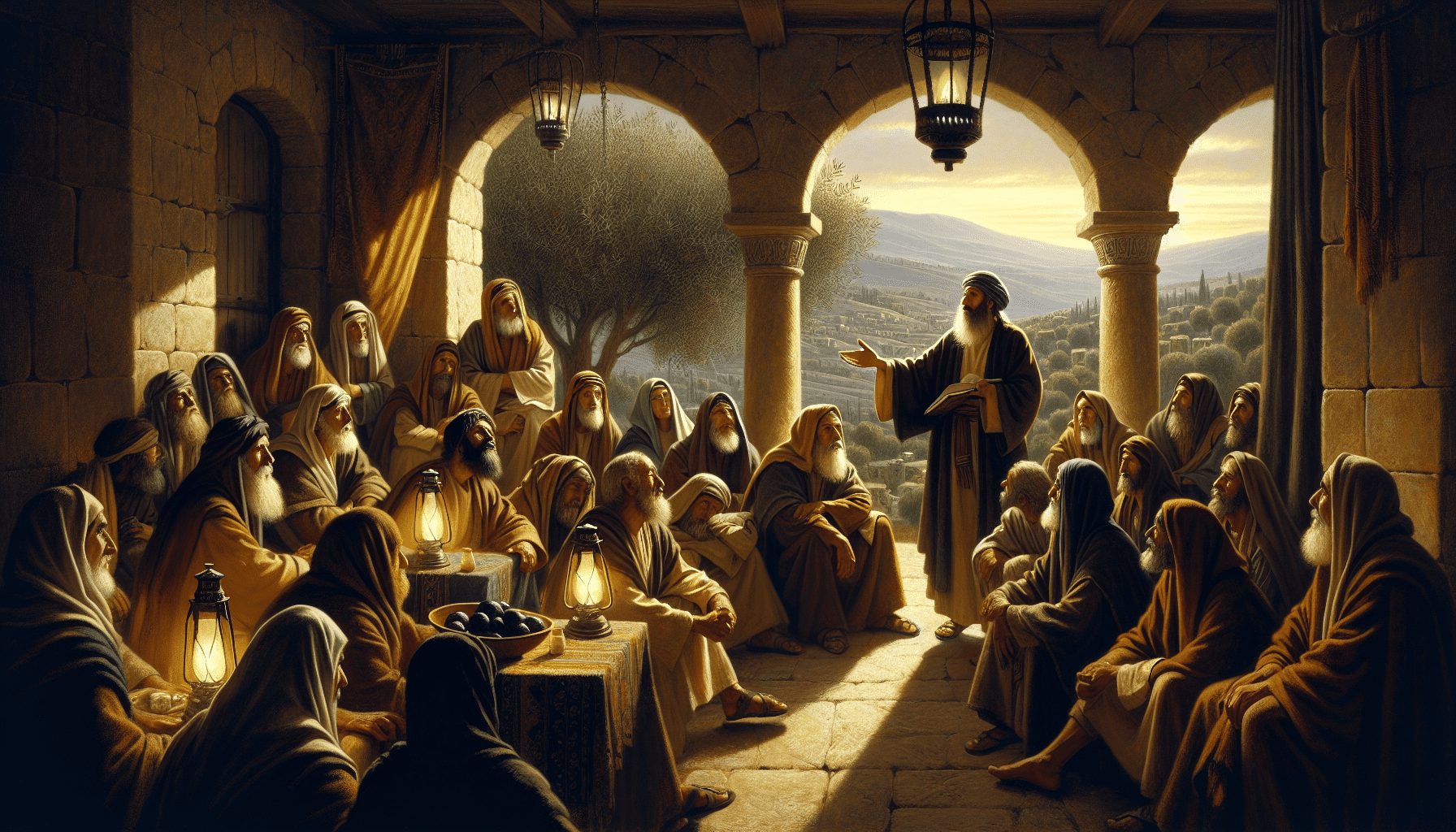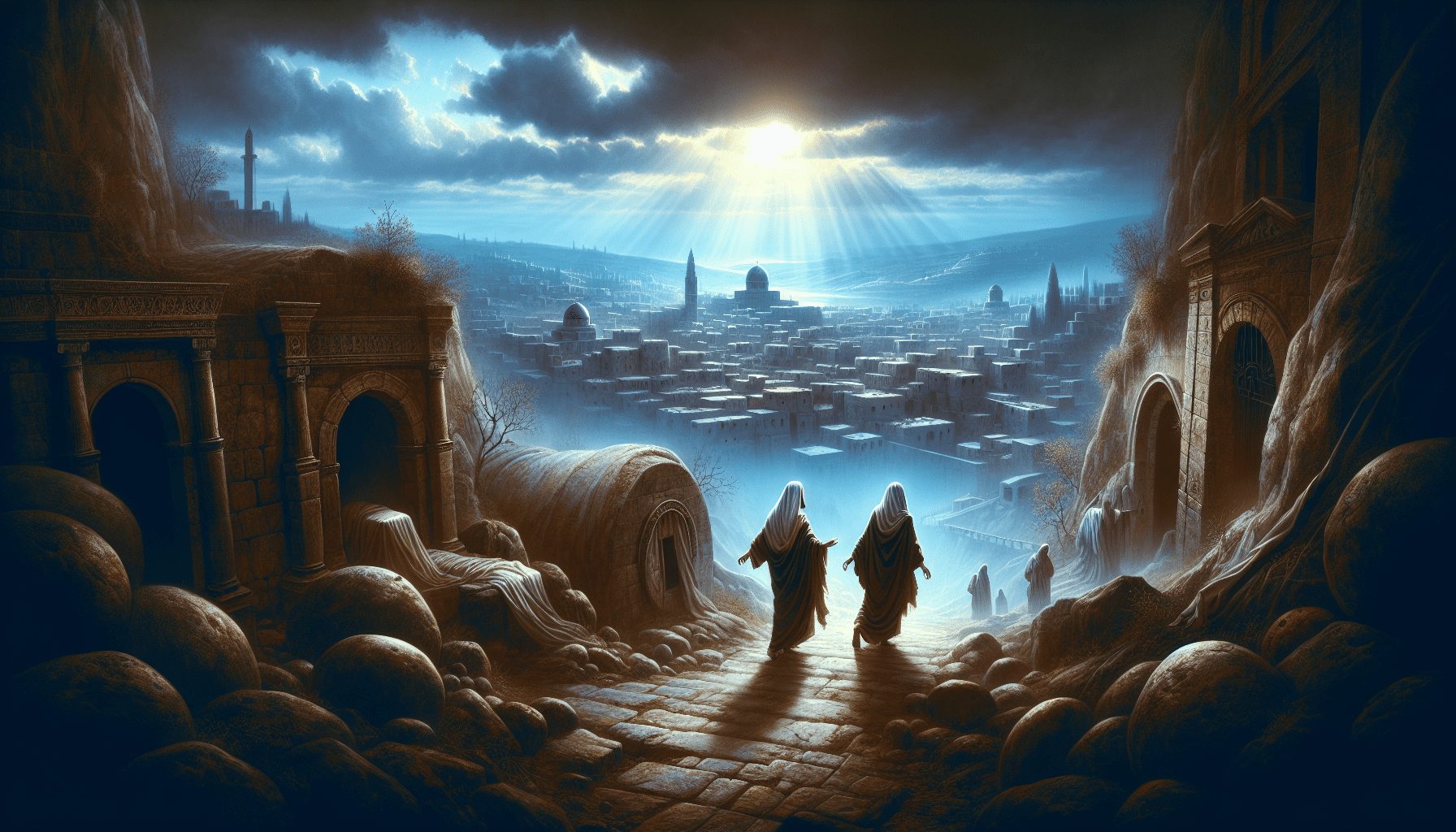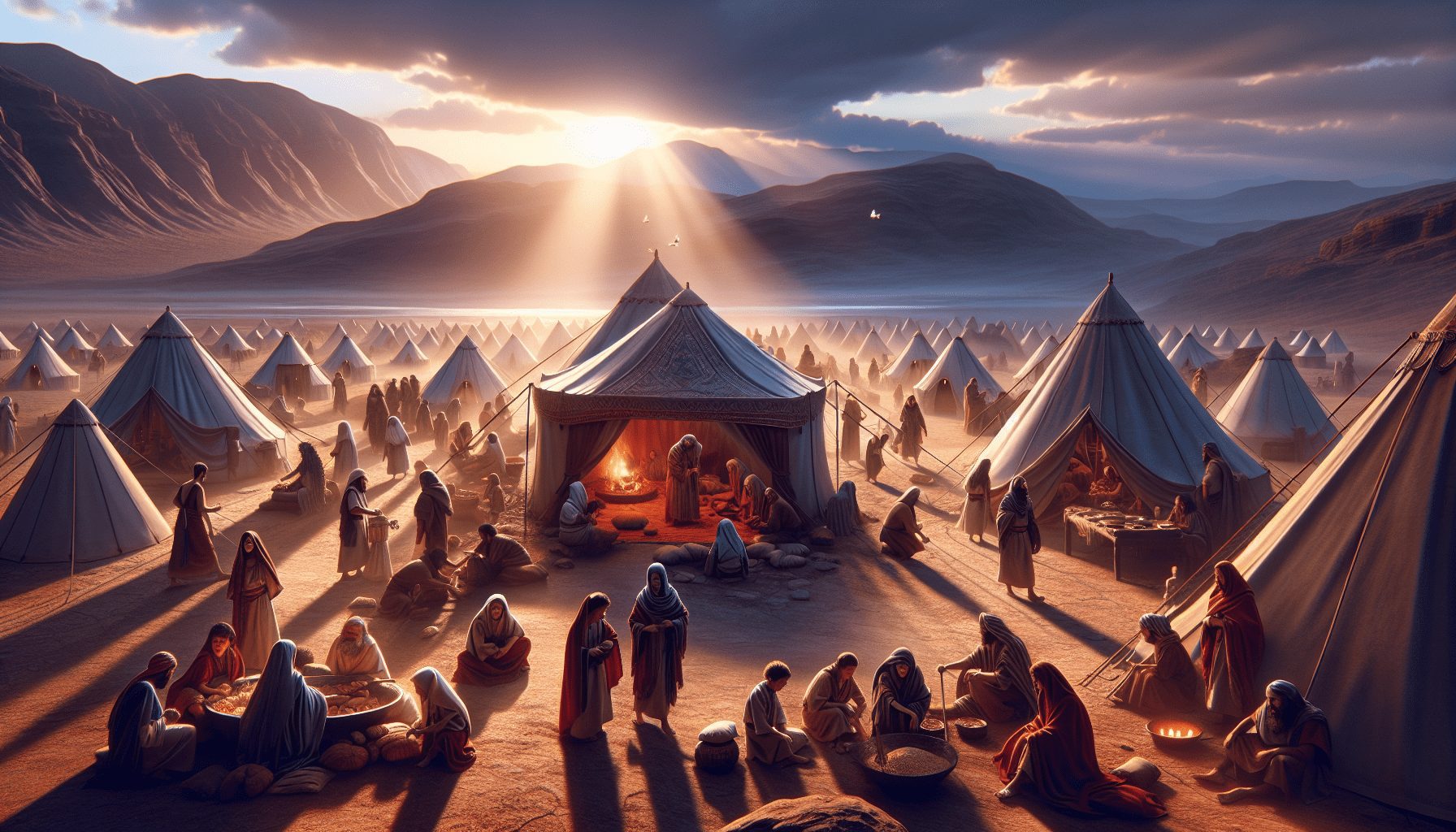**The Commissioning of the Twelve and the Miracles of Christ**
The sun hung low over the hills of Galilee, casting golden light upon the dusty roads where Jesus walked with His disciples. The time had come—He had spent nights in prayer, seeking the Father’s will, and now He gathered His twelve closest followers. Simon, whom He called Peter, stood with his brother Andrew, their faces weathered from years of fishing. James and John, the fiery sons of Zebedee, listened intently, their hearts burning with devotion. Philip, Bartholomew, Matthew the tax collector, Thomas the doubter, James the son of Alphaeus, Simon the Zealot, Judas the brother of James, and Judas Iscariot, who would one day betray Him—all stood before the Lord, awaiting His word.
Jesus looked upon them with deep compassion. “I give you power and authority over all demons and to cure diseases,” He declared, His voice steady and full of divine authority. “Go and proclaim the kingdom of God and heal the sick.” He instructed them to take nothing for their journey—no staff, no bag, no bread, no money, not even an extra tunic. “Whatever house you enter, stay there until you leave that town,” He said. “And if any do not welcome you, shake the dust off your feet as a testimony against them.”
With these words, the Twelve set out, two by two, into the villages of Galilee. The power of God moved mightily through them—demons fled at their command, the sick were restored, and the good news of the kingdom echoed through the land.
### **Herod’s Troubled Heart**
Meanwhile, in the palace of Herod Antipas, ruler of Galilee, whispers of Jesus’ ministry reached the ears of the tetrarch. The king sat upon his gilded throne, his brow furrowed in confusion and fear. “Who is this man?” he muttered to his advisors. “Some say He is John the Baptist, risen from the dead. Others say Elijah has appeared, or one of the ancient prophets has returned.”
Herod’s heart pounded with guilt, for he had ordered the execution of John the Baptist. The memory of that fateful banquet haunted him—Herodias’ daughter dancing, his reckless oath, the prophet’s head brought on a platter. Now, reports of miracles and teachings stirred unrest among the people. “I must see Him,” Herod declared, though his desire was not born of faith, but of fear and curiosity.
### **The Feeding of the Five Thousand**
As the Twelve returned from their mission, they rejoiced, telling Jesus all they had done. Wanting solitude, He took them by boat to a deserted place near Bethsaida. But the crowds, desperate for His words and healing, followed on foot. When Jesus stepped ashore, He saw them—thousands of men, women, and children, their faces filled with hope.
His heart overflowed with compassion. “They are like sheep without a shepherd,” He said to His disciples. “Give them something to eat.”
Philip, ever practical, replied, “Even two hundred denarii worth of bread would not be enough for each to have a little!”
Then Andrew spoke up, “There is a boy here with five barley loaves and two fish—but what are they among so many?”
Jesus smiled. “Bring them to Me.”
He commanded the people to sit in groups of fifty upon the green grass. Taking the loaves and fish, He lifted His eyes to heaven, gave thanks, and broke them. Miraculously, the food multiplied in His hands. The disciples distributed it, and as they did, baskets passed from one person to another—never emptying. The people ate until they were satisfied, and when the fragments were gathered, twelve baskets remained, one for each disciple.
### **Peter’s Confession and the Cost of Discipleship**
After this great miracle, Jesus withdrew to pray alone. When He rejoined His disciples, He asked them a piercing question: “Who do the crowds say that I am?”
“Some say John the Baptist, others Elijah, and still others that one of the prophets of old has risen,” they answered.
Then Jesus looked into their eyes. “But who do you say that I am?”
Peter, bold as ever, declared, “You are the Christ, the Messiah of God!”
Jesus affirmed his confession but warned them not to tell others, for His time had not yet come. Then He revealed the truth they struggled to accept: “The Son of Man must suffer many things, be rejected by the elders, chief priests, and scribes, be killed, and on the third day be raised.”
Peter, horrified, took Him aside. “Never, Lord! This shall not happen to You!”
But Jesus turned and rebuked him sharply. “Get behind Me, Satan! You are not mindful of the things of God, but of men.”
Then, calling the crowd to Him, He spoke words that would echo through the ages: “If anyone would come after Me, let him deny himself, take up his cross daily, and follow Me. For whoever would save his life will lose it, but whoever loses his life for My sake will save it.”
### **The Transfiguration**
Eight days later, Jesus took Peter, James, and John up a high mountain to pray. As He prayed, His appearance changed—His face shone like the sun, and His garments became dazzling white. Suddenly, two men appeared with Him—Moses and Elijah—speaking of His coming departure in Jerusalem.
Peter, overwhelmed, blurted out, “Master, it is good for us to be here! Let us make three tents—one for You, one for Moses, and one for Elijah!”
But even as he spoke, a bright cloud enveloped them, and the voice of the Father thundered: “This is My beloved Son. Hear Him!”
Terrified, the disciples fell facedown. Jesus touched them gently. “Rise, and do not be afraid.” When they looked up, only Jesus remained.
As they descended the mountain, He commanded them to tell no one of the vision until after His resurrection.
### **The Healing of a Demon-Possessed Boy**
At the foot of the mountain, a desperate crowd had gathered. A man cried out, “Teacher, I beg You, look at my son! He is my only child. A spirit seizes him, and he suddenly screams. It throws him into convulsions, and he foams at the mouth. It scarcely leaves him and is destroying him!”
The disciples had tried to cast it out but failed. Jesus sighed. “O faithless and twisted generation! How long shall I be with you and bear with you?” Then He commanded, “Bring your son here.”
As the boy approached, the demon threw him to the ground in violent convulsions. Jesus rebuked the unclean spirit, healed the boy, and gave him back to his father. The crowd stood in awe.
Later, the disciples asked in private, “Why could we not cast it out?”
Jesus replied, “This kind does not go out except by prayer and fasting.”
### **The Way of the Cross**
As they journeyed toward Jerusalem, Jesus spoke again of His coming suffering, but the disciples did not understand. Instead, they argued among themselves about who was the greatest.
Jesus, knowing their hearts, took a child and set him by His side. “Whoever receives this little child in My name receives Me, and whoever receives Me receives Him who sent Me. For he who is least among you all—he is the greatest.”
John, hesitant, spoke up. “Master, we saw someone casting out demons in Your name, and we forbade him because he does not follow with us.”
But Jesus answered, “Do not forbid him, for whoever is not against you is for you.”
### **The Journey to Jerusalem**
As the days passed, Jesus resolutely set His face toward Jerusalem. He sent messengers ahead, but a Samaritan village refused to receive Him. James and John, furious, asked, “Lord, do You want us to command fire to come down from heaven and consume them?”
Jesus turned and rebuked them. “You do not know what manner of spirit you are of. The Son of Man did not come to destroy lives, but to save them.”
And so they pressed on, for the time of fulfillment drew near. The road to the cross lay ahead, and Jesus walked it with unwavering purpose—the Savior of the world, the Lamb of God, who would take away the sins of all who believe.




